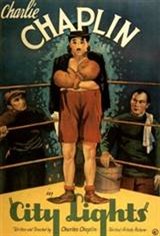

| Score: | 10 / 10 |
| Released: | |
| Director: | |
| Producer: | |
| Studio: | |
| Cast: | |
| Genre: | |
| Length: | minutes |
Charles Chaplin was deep into production of his silent City Lights when Hollywood was overwhelmed by the talkie revolution. After months of anguished contemplation, Chaplin decided to finish the film as it began--in silence, save for a musical score and an occasional sound effect. Once again cast as the Little Tramp, Chaplin makes the acquaintance of a blind flower girl (Virginia Cherrill), who through a series of coincidences has gotten the impression that the shabby tramp is a millionaire. A second storyline begins when the tramp rescues a genuine millionaire (Harry Myers) from committing suicide. When drunk, the millionaire expansively treats the tramp as a friend and equal; when sober, he doesn't even recognize him. The two plots come together when the tramp attempts to raise enough money for the blind girl to have an eye operation. Highlights include an extended boxing sequence pitting scrawny Chaplin against muscle-bound Hank Mann, and the poignant final scene in which the now-sighted flower girl sees her impoverished benefactor for the first time. Chaplin's decision to release the silent City Lights three years into the talkie era was partially vindicated when more than one critic singled out this comedy in pantomime as the best picture of 1931.
Front Row Centre |
Winnipeg Movies |
Edmonton Movie Guide |
Enprimeur |
US Showtimes |
Tribute Movies (US) |
Coming Soon -
What's Playing -
Movies by Theatre -
Showtimes powered by Tribute.ca | © 2000-2024 FilmCan